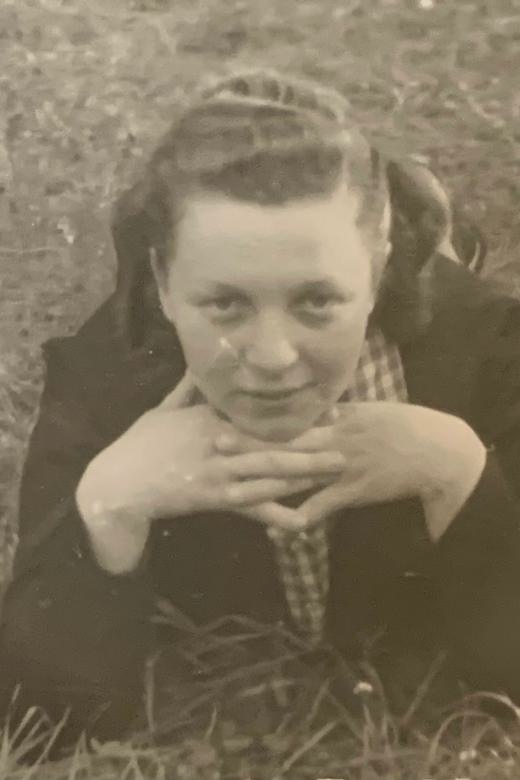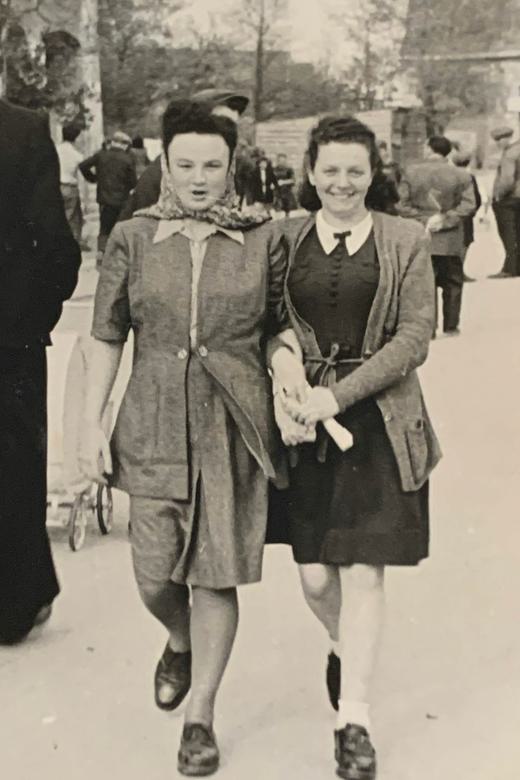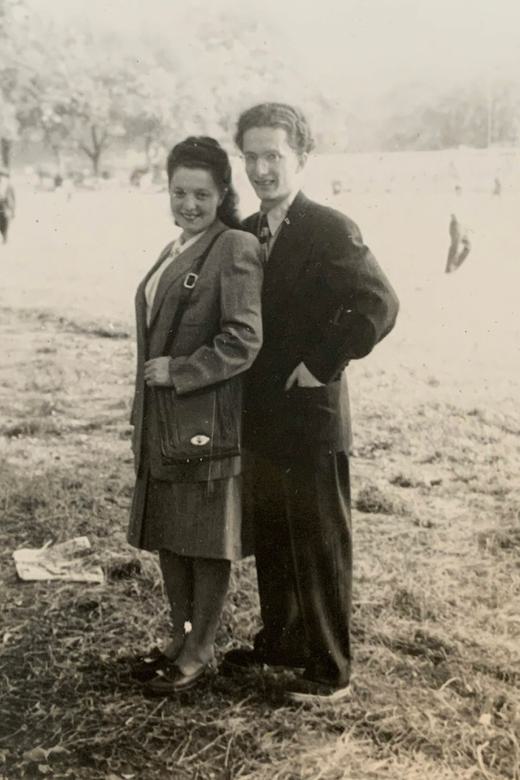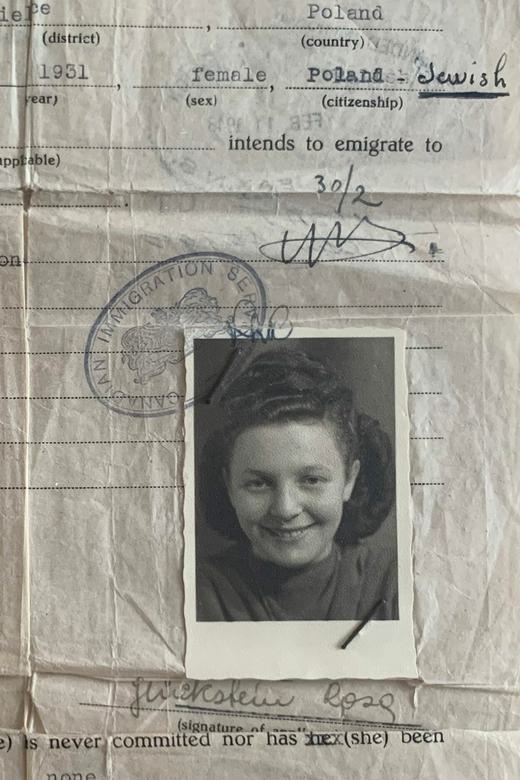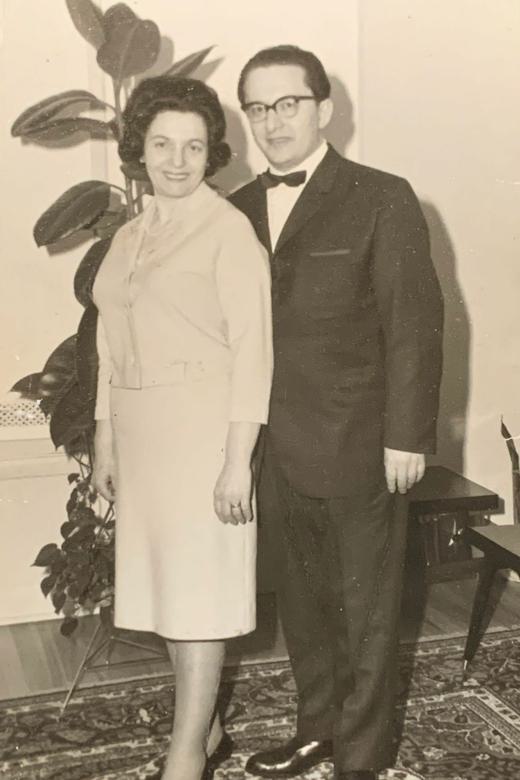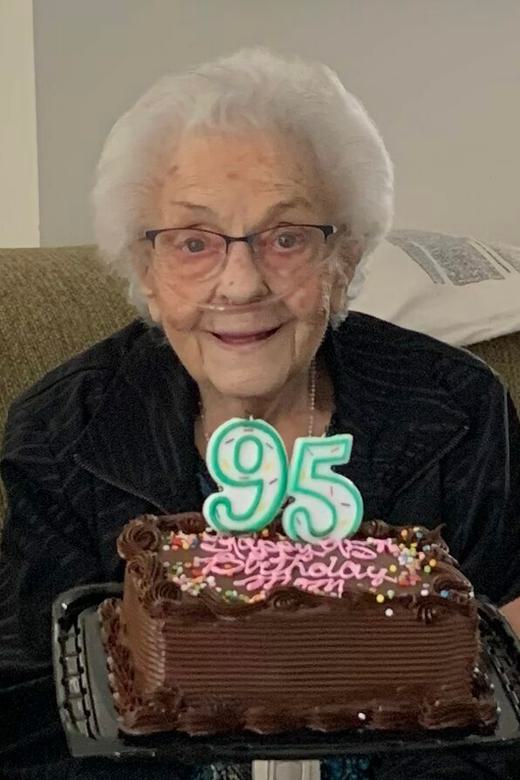Rose Besser
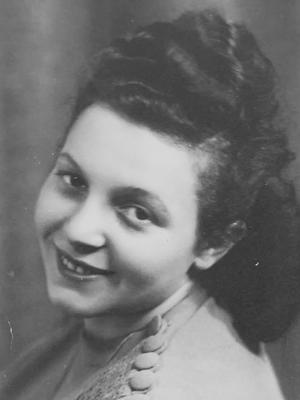
Born: Będzin, Poland, 1925
Wartime experience: Ghetto and camps
Writing Partner: Rachel Iskov
Rose Besser (née Rózia Gliksztein) was born in Będzin, Poland, in 1925, and grew up in nearby Sosnowiec. In 1941, under the Nazi occupation of Poland, Rose was imprisoned for three weeks in a jail in Będzin for illegally selling shoes to support her family.
Rose was then forced to live in the Kamionka ghetto (between Sosnowiec and Będzin). After being deported from the ghetto, she endured eight Nazi camps before the end of the war: Eichthal, Johansdorf, Annaberg, Sakrau, Treskau, Wiesau, Bunzlau and Peterswaldau. Rose spent about three-to-six months at each camp, usually performing work such as cooking and cleaning in the men’s camps. She was liberated by Soviet soldiers in May 1945 from Peterswaldau, a women’s concentration camp that was a subcamp of the Gross-Rosen concentration camp.
Rose was the sole survivor among her thirty-eight relatives, and she also lost her parents and a brother and sister in the Holocaust. Rose met her husband, Fromek (Frank), in a camp, and they immigrated together to Montreal, Canada, in 1948, where they were married. They raised a family in Montreal, later moving to Toronto. Rose passed away in 2020.
Sosnowiec before the War
We really enjoyed our life before the war — we used to get together with our relatives for Chanukah and other holidays, and on Saturday afternoons. My uncles would come to play cards, and the kids played around with a ball or with small things. We were always busy. I went to a public school and had a very lively childhood.
Our city of Sosnowiec in Poland had a population of over 100,000. We had our own Jewish hospital and a Jewish high school. There were actually two Jewish schools for girls and two Jewish schools for boys, because Jews were not accepted into the Catholic school. Poland is a Catholic country, and schools were government-run. There was also a Jewish business college built a couple years before the war. During the war, this college was used as a gathering place for the Jews before they were sent to the concentration camps and death camps.
My father, Yosef, and my mother, Sara, were natives of the same province. I had a brother, Fiszel, who was four years younger than me. My sister, Masza, was seven years younger and at six years old hadn’t yet started school when the war broke out; a girl gave her private lessons so that she could learn to read and write.
We lived in a very nice apartment, considering the situation in Poland. My parents were hard-working people. My mother used to help out in our business, so I would take care of certain things at home, like preparing lunch for my siblings. A woman came in once a week to clean our apartment, but the rest of the time I helped my mother, mainly with grocery shopping. I marked what she needed on a piece of paper and did the shopping. In those days, there were no refrigerators, so we couldn’t stock up; we had to only buy food that could be used in a day or two, otherwise there was no place to put it. In the wintertime, we could put food on the windowsill, but in the summer it was hot, so I always used to go with mother to the store or to the market to shop for Shabbat and help carry home the groceries and other purchases.
And that’s how life was. For my parents, it was a hard life, but somehow we managed and were very happy. We never looked at what others had. We were happy with whatever we had. In the summertime, when I was older, we would go out of town to the country by train to breathe the fresh air of the small towns. My parents rented a cottage, and we spent six weeks there. We missed our friends, but we made new friends there.
My father was a social person who was very involved with his own friends. His friends had children, and we used to get together with them or we would visit relatives. Every Saturday, we’d walk to visit someone; there was no transportation. We couldn’t make telephone calls to find out if they were going to be home, but everybody took a chance.
I was also very outgoing and had many friends. I belonged to Young Judaea, a youth movement also known as Hanoar Hatzioni, having joined when I was twelve or thirteen. Every evening, we would get together from four to six in the afternoon and have all kind of discussions, sing Hebrew songs and learn about life on a kibbutz in Palestine. On Sunday mornings after breakfast, we went to the Jewish National Fund (JNF), which is also called Keren Kayemet LeIsrael, and learned about the map of Palestine. We also learned Morse code. After all these years, I still remember how to do it. In the summertime we had picnics outdoors. The organization provided a social life for us kids in those days. I still have my group picture, taken in March 1938 with all my friends.
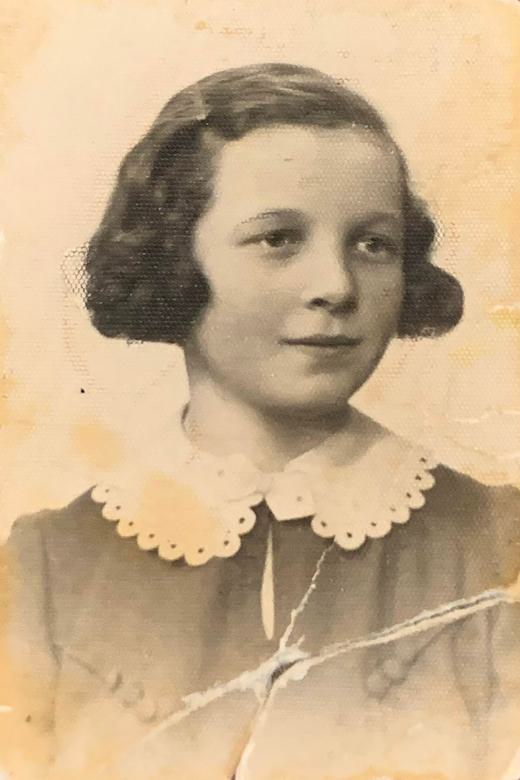
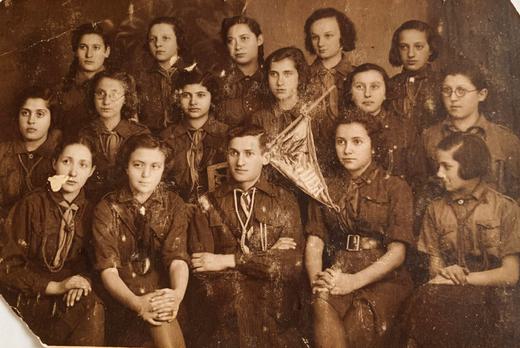
Rose (back row, second from the left) with her youth movement group, Young Judaea (Hanoar Hatzioni), before the war. Sosnowiec, 1938.
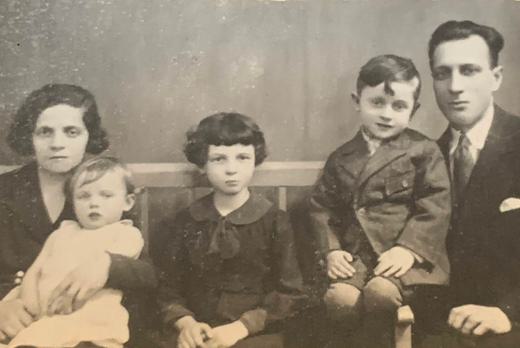
Rose (centre) with her family before the war. From left to right: Rose’s mother, Sara, her sister, Masza, Rose, her brother, Fiszel, and her father, Yosef. Sosnowiec, circa 1936–1938.
Encounter with the Gestapo
It was very hard to earn a living through a small business. My father was a bookbinder by trade and had opened up a little box factory, making boxes for sweaters, underwear, socks and all kind of things. We were far from rich, but we made a decent living. After my father passed away, we had to go the companies that had bought boxes from us and still owed us money — we needed something to live on. My mother was a very scared, fragile type of person, so as the oldest, I had to make sure that they paid us whatever they owed. Every time I went to them they said they had no money, that they could only pay us in merchandise. So I had to go out and sell the merchandise. Where was I going to sell these things? There was a market, but Jews weren’t allowed to go there. But I had to bring in money; we had to pay the rent and we had to feed the kids. I had to take on all the responsibilities.
We got shoes from the shoe companies, socks from the stockings company, and so on; whatever products the companies produced. But we couldn’t eat merchandise. So I would go out to the market wearing a very loose coat, carrying some of the merchandise underneath it. Whenever I saw people arriving by streetcar, I approached them and asked, “Would you like this? Would you like that? I’ll sell it to you cheaper.” We still had Polish money, and I tried to secretly sell the merchandise to get a few zlotys and bring in some income for the family.
While I was doing this one day, I was caught by a German policeman. We always had merchandise in the house and whenever I went out to sell some of it, my brother would follow me at a distance in case I got caught; that way, he’d know to run home and tell our mother to get the merchandise out of the house. We could put some of it in our attic and also had neighbours with whom we could leave a box of goods. When I was caught by the officer, he had actually been running after a young boy who was selling something but he bumped into me and my stuff fell out. As soon as he saw it he said, “Oh, you little swindler. You’re selling and you’re gonna pay for it.” I was maybe fifteen years old.
We were on the ground floor of the Gestapo headquarters. When I refused to say anything, they opened a door and threw me down into the basement. The basement was completely dark. I thought I was falling onto the floor, but instead I fell on top of people. I couldn’t see any of their faces. When I landed, I asked them, “Where am I? Who are you?” They were all Jews. They had all committed very big crimes — selling bread or a piece of meat on the black market without ration cards, or crossing the border without a passport. Such crimes!
We stayed there, one on top of another until later in the evening when a van came. As we were taken out of the basement, I began to recognize some of the people I’d been placed with, including the mother of a school friend (this friend now lives in Montreal). When we got into the van, the police said, “Now, you’re going to Auschwitz. If anyone wants to tell the truth, you still have a chance.” Many of the people in the van were from other towns and didn’t recognize the route the van was travelling; they didn’t know whether they were going to Auschwitz or somewhere else. I was from the town, so I knew the route to Auschwitz. I looked out the little window in the van and told them what I saw: “You know what, we’re not going to Auschwitz; we’re going to Będzin.” Będzin was only eight kilometres away from Sosnowiec. In the summertime, before the war, we used to walk with groups of friends from Sosnowiec to Będzin for fun. I also knew Będzin very well because I was born there and we had family there.
When we arrived at the jail in Będzin, the police separated the men and women into different rooms and assigned us bunks — the whole group consisted of maybe ten or twelve people. I stayed there for twenty-one days. All that time, my mother didn’t know what had happened to me or where I was. One day, when somebody came to make a delivery, I recognized that he was a Jew and asked him, “Since you are from Będzin, could you do me a favour?” I told him that I had an aunt named Fuchs who lived not far away with her parents, at number 11 on Browarna Street, and asked him to please tell them that Rózia was in the jail. He told me not to say anything, but he found my relatives and that’s how they knew what happened to me, that I hadn’t been taken to Auschwitz.
After twenty-one days, the Germans let me out on Simchat Torah, which was really my birthday. My Jewish birthday was on Simchat Torah, even though my parents registered me later for September 6 when I wasn’t actually born on that day. I went home, but by that time there was no school for us, no high school, nothing. I was afraid to go back to selling things, but I continued to do it anyway; I had no choice because we had to live.
We were on the ground floor of the Gestapo headquarters. When I refused to say anything, they opened a door and threw me down into the basement.
From Camp to Camp
My mother was only forty when she perished. My father wasn’t even thirty-nine when he passed away in 1941, before the deportations started. My sister was eight and my brother twelve. By the time I was sixteen, I was already in a camp.
I got a notice to report to the Dulag, or Durchgangslager, a transit camp, and to only bring a small suitcase with me because I was going to be checked out and then I could probably go home. This was the one set up at the Jewish business college in Sosnowiec, where the Jews had been rounded up. I had no choice; I had to go because I had to have the card from the company I worked for, Braun’s, stamped. But when I got there, that had nothing to do with it; the Germans had just said that to make me go there. They went through everything I had and I stayed there for three weeks.
The place was so filthy that the insects ate everybody up. I was all bitten up, and we had no washroom for bathing, just somewhere to wash our faces. We had no change of clothes. I figured that I would stay there for a long time and wouldn’t survive. Then a note came that the Germans needed eight girls for a men’s labour camp. It was an Erholung camp, as they called it in German, a rehab camp. I thought that maybe they needed nurses and it would be a good place to go. I was so tired of sitting around in the Dulag and, since I was with a group of girls about the same age, I figured that we should organize the group to go together. We thought there was no point in sitting in the Dulag; we had no food and would starve there, so we might as well see what was there for us.
We headed out to the camp one evening before Christmas 1942, and when we arrived, we found a few girls already there, so there were fourteen of us all together. The girls told us right away that this was not a rehab camp, and we’d see that in the morning. The next morning, we were gathered together. It was winter and everybody was covered with blankets. Each person got one blanket and it was hard to know how best to use it: under us as a sheet; under our heads as a pillow; or on top to cover ourselves. In the morning, at Appell, the roll call, the Germans checked people out, counting how many there were. It was a men’s camp, but it was not Polish. The girls were from Poland and the guys were from the Netherlands, Belgium, France and Germany — all were Jews. There must have been maybe two hundred to three hundred men.
What I saw when I looked at those men in the morning was skeletal, half-dead people. Each one was worse than the other. And we had figured we were going be nurses there! In fact, the Germans wanted us there to help clean, wash the laundry, work in the kitchen peeling potatoes — to do domestic work.
The name of the camp was Eichthal. In all, I was in eight camps during the war: first in Eichthal, then Johansdorf, Annaberg, Sakrau, Treskau, Wiesau, Bunzlau and Peterswaldau. I was at each of those camps for three or four or six months. The boys were working on building the highway, the German Reichsautobahn. As soon as one part was finished, we were taken to another camp with another group of boys. The camps were about five, seven or ten kilometres away from each other, so there were camps everywhere. A lot of the boys passed away because of the work conditions, the hunger and the cold. They were working outside on the highway in wintertime with no special clothing, shoes or anything. The Germans would just replace one group of boys with another and the few people remaining, whoever survived, would be taken into the other camp. We went from camp to camp from 1942 until May 8, 1945.
